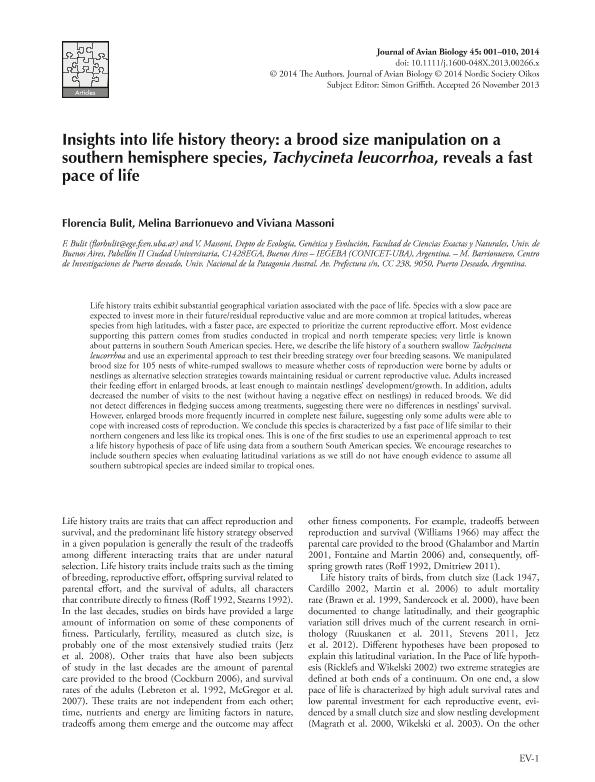Mostrar el registro sencillo del ítem
dc.contributor.author
Bulit, Florencia

dc.contributor.author
Barrionuevo, Melina

dc.contributor.author
Massoni, Viviana

dc.date.available
2017-07-05T19:30:05Z
dc.date.issued
2014-05
dc.identifier.citation
Bulit, Florencia; Barrionuevo, Melina; Massoni, Viviana; Insights into life history theory: a brood size manipulation on a southern hemisphere species, Tachycineta leucorrhoa, reveals a fast pace of life ; Wiley; Journal Of Avian Biology; 45; 3; 5-2014; 225-234
dc.identifier.issn
0908-8857
dc.identifier.uri
http://hdl.handle.net/11336/19649
dc.description.abstract
Life history traits exhibit substantial geographical variation associated with the pace of life. Species with a slow pace are expected to invest more in their future/residual reproductive value and are more common at tropical latitudes, whereas species from high latitudes, with a faster pace, are expected to prioritize the current reproductive effort. Most evidence supporting this pattern comes from studies conducted in tropical and north temperate species; very little is known about patterns in southern South American species. Here, we describe the life history of a southern swallow Tachycineta leucorrhoa and use an experimental approach to test their breeding strategy over four breeding seasons. We manipulated brood size for 105 nests of white-rumped swallows to measure whether costs of reproduction were borne by adults or nestlings as alternative selection strategies towards maintaining residual or current reproductive value. Adults increased their feeding effort in enlarged broods, at least enough to maintain nestlings’ development/growth. In addition, adults decreased the number of visits to the nest (without having a negative effect on nestlings) in reduced broods. We did not detect differences in fledging success among treatments, suggesting there were no differences in nestlings’ survival. However, enlarged broods more frequently incurred in complete nest failure, suggesting only some adults were able to cope with increased costs of reproduction. We conclude this species is characterized by a fast pace of life similar to their northern congeners and less like its tropical ones. This is one of the first studies to use an experimental approach to test a life history hypothesis of pace of life using data from a southern South American species. We encourage researches to include southern species when evaluating latitudinal variations as we still do not have enough evidence to assume all southern subtropical species are indeed similar to tropical ones.
dc.format
application/pdf
dc.language.iso
eng
dc.publisher
Wiley

dc.rights
info:eu-repo/semantics/openAccess
dc.rights.uri
https://creativecommons.org/licenses/by-nc-sa/2.5/ar/
dc.subject
Life
dc.subject
History
dc.subject
Manipulation
dc.subject
Tachycineta Leucorrhoa
dc.subject.classification
Ecología

dc.subject.classification
Ciencias Biológicas

dc.subject.classification
CIENCIAS NATURALES Y EXACTAS

dc.title
Insights into life history theory: a brood size manipulation on a southern hemisphere species, Tachycineta leucorrhoa, reveals a fast pace of life
dc.type
info:eu-repo/semantics/article
dc.type
info:ar-repo/semantics/artículo
dc.type
info:eu-repo/semantics/publishedVersion
dc.date.updated
2017-07-05T15:03:42Z
dc.journal.volume
45
dc.journal.number
3
dc.journal.pagination
225-234
dc.journal.pais
Estados Unidos

dc.journal.ciudad
Hoboken
dc.description.fil
Fil: Bulit, Florencia. Consejo Nacional de Investigaciones Científicas y Técnicas. Oficina de Coordinación Administrativa Ciudad Universitaria. Instituto de Ecología, Genética y Evolución de Buenos Aires. Universidad de Buenos Aires. Facultad de Ciencias Exactas y Naturales. Instituto de Ecología, Genética y Evolución de Buenos Aires; Argentina
dc.description.fil
Fil: Barrionuevo, Melina. Universidad Nacional de la Patagonia Austral. Unidad Academica Caleta Olivia. Centro de Investigaciones Puerto Deseado; Argentina. Consejo Nacional de Investigaciones Científicas y Técnicas; Argentina
dc.description.fil
Fil: Massoni, Viviana. Consejo Nacional de Investigaciones Científicas y Técnicas. Oficina de Coordinación Administrativa Ciudad Universitaria. Instituto de Ecología, Genética y Evolución de Buenos Aires. Universidad de Buenos Aires. Facultad de Ciencias Exactas y Naturales. Instituto de Ecología, Genética y Evolución de Buenos Aires; Argentina
dc.journal.title
Journal Of Avian Biology

dc.relation.alternativeid
info:eu-repo/semantics/altIdentifier/doi/http://dx.doi.org/10.1111/j.1600-048X.2013.00266.x
dc.relation.alternativeid
info:eu-repo/semantics/altIdentifier/url/http://onlinelibrary.wiley.com/doi/10.1111/j.1600-048X.2013.00266.x/abstract
Archivos asociados
